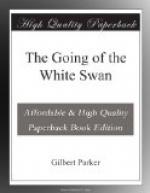“Father,” said the boy, his face pinched with pain for a moment, “it hurts so, all over, every once in a while.”
His fingers caressed the leg just below the knee.
“Father,” he suddenly added, “what does it mean when you hear a bird sing in the middle of the night?”
The woodsman looked down anxiously into the boy’s face. “It hasn’t no meaning, Dominique. There ain’t such a thing on the Labrador Heights as a bird singin’ in the night. That’s only in warm countries where there’s nightingales. So—bien sur!”
The boy had a wise, dreamy, speculative look.
“Well, I guess it was a nightingale—it didn’t sing like any I ever heard.”
The look of nervousness deepened in the woodman’s face. “What did it sing like, Dominique?”
“So it made you shiver. You wanted it to go on, and yet you didn’t want it. It was pretty, but you felt as if something was going to snap inside of you.”
“When did you hear it, my son?”
“Twice last night—and—and I guess it was Sunday the other time. I don’t know, for there hasn’t been no Sunday up here since mother went away—has there?”
“Mebbe not.”
The veins were beating like live cords in the man’s throat and at his temples.
“‘Twas just the same as Father Corraine bein’ here, when mother had Sunday, wasn’t it?”
The man made no reply; but a gloom drew down his forehead, and his lips doubled in as though he endured physical pain. He got to his feet and paced the floor. For weeks he had listened to the same kind of talk from this wounded, and, as he thought, dying son, and he was getting less and less able to bear it. The boy at nine years of age was, in manner of speech, the merest child, but his thoughts were sometimes large and wise. The only white child within a compass of a hundred miles or so; the lonely life of the hills and plains, so austere in winter, so melted to a sober joy in summer; listening to the talk of his elders at camp-fires and on the hunting-trail, when, even as an infant almost, he was swung in a blanket from a tree or was packed in the torch-crane of a canoe; and more than all, the care of a good, loving—if passionate—little mother: all these had made him far wiser than his years. He had been hours upon hours each day alone with the birds, and squirrels, and wild animals, and something of the keen scent and instinct of the animal world had entered into his body and brain, so that he felt what he could not understand.
He saw that he had worried his father, and it troubled him. He thought of something.
“Daddy,” he said, “let me have it.”
A smile struggled for life in the hunter’s face, as he turned to the wall and took down the skin of a silver fox. He held it on his palm for a moment, looking at it in an interested, satisfied way, then he brought it over and put it into the child’s hands; and the smile now shaped itself, as he saw an eager pale face buried in the soft fur.




